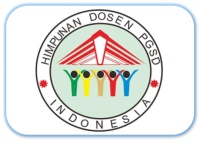Peningkatan Proses Pembelajaran Tematik Terpadu Dengan Menggunakan Model Problem Based Learning (PBL) Di Kelas V SD Negeri 05 Bandar Buat Kota Padang
Abstract
Keywords
References
Abdul, Majid. 2014. Pembelajaran Tematik Terpadu. Bandung: PT RemajaRosdakarya.
Amini, R., & Helsa, Y. (2018, September). Integrated model In science for elementary school. In Journal of Physics: Conference Series (Vol.1088,No. 1, p. 012057). IOP Publishing.
Desyandri. (2012). The Usage of Contextual Teaching and Learning (CTL) Approach to improve the process and learning outcome of Singing to the Student Class III Elementary School YPKK of Padang State University. Pedagogi: Jurnal Ilmu Pendidikan, 12(1), 36–52. Retrieved from http://pedagogi.ppj.unp.ac.id/index.php/pedagogi/article/view/231
Desyandri, D., & Vernanda. (2017). Pengembangan Bahan Ajar Tematik Terpadu di Kelas V Sekolah Dasar Menggunakan Identifikasi Masalah. In Seminar Nasional HDPGSDI Wilayah 4 (pp. 163–174).
Desyandri, Muhammadi, Mansurdin, & Fahmi, R. (2019). Development of Integrated Thematic Teaching Material Used Discovery Learning Model in V Grade Elementary School. Jurnal Konseling Dan Pendidiikan, 7(1), 16–22. https://doi.org/https://doi.org/10.29210/129400
Faisal. 2014. Sukses Mengawal Kurikulum 2013 di SD (Teori dan Aplikasi). Yogyakarta:Diandra Creative
Jihad, Asep. 2012. Evaluasi Pembelajaran. Yogyakarta: Multi Pressindo.
Kemendikbud. 2014. Materi Pelatihan Implementasi Kurikulum 2013 Tahun 2014 SD Kelas I. Jakarta: Kementerian Pendidikan dan Kebudayaan.
Permendikbud. 2013. Kerangka Dasar Dan Struktur Kurikulum Sekolah Dasar/Madrasah Ibtidaiyah. Jakarta: Kementerian Pendidikan dan Kebudayaan
Purwanto, Ngalim. 2010. Prinsip-prinsip dan Teknik Evaluasi Pengajaran. Bandung: Remaja Rosdakarya
Taufina, dan Muhammadi. 2011. Mozaik Pembelajaran Inovatif. Padang: Sukabina Press.
Taufina dan Mayarnimar. (2017). Validity Analysis of the VARK (Visual, Auditory, Read-write, and Kinesthetic) Model-Based Reading and Writing Instructional Materials for the 1 st Grade Student Of Elementary School. (online) vol 118 (http://www.atlantispress.com/preceedings/icset-17/25/886639), diakses tanggal 22 Juni 2019.
Uno, B Hamzah, dkk. 2012. Menjadi Peneliti PTK yang Profesional. Jakarta: Bumi Aksara.
DOI: http://dx.doi.org/10.24036/e-jipsd.v7i6.6573


